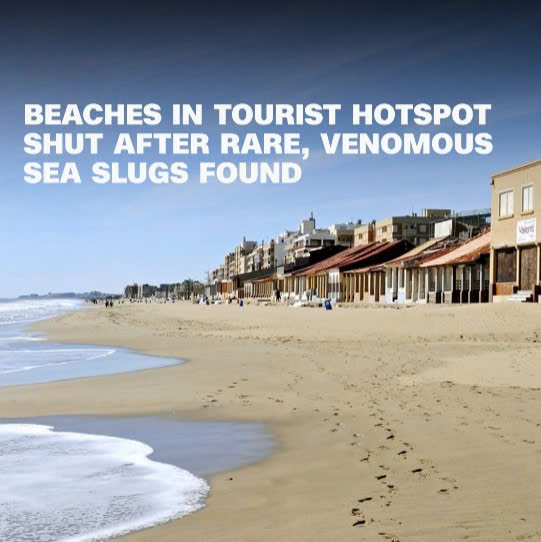Beaches in the coastal town of Guardamar del Segura, located about 25 miles south of Alicante along Spain’s picturesque Costa Blanca, were temporarily shut down earlier this week after local authorities discovered two rare and venomous sea slugs in the waters. Officials confirmed that swimming was immediately prohibited across all municipal beaches in order to ensure public safety, as the sudden appearance of these creatures posed potential health risks to unsuspecting visitors.

The unusual marine animal responsible for the closures is the Glaucus atlanticus, more commonly known as the “blue dragon.” Despite its delicate and striking appearance, this tiny sea slug is far from harmless. Measuring only about 1.2 inches in length, the blue dragon has evolved an impressive survival strategy: it feeds on venomous marine organisms, such as the Portuguese man o’ war, and then recycles and concentrates their venom. This allows the slug to wield a sting strong enough to paralyze prey up to 300 times its size, making it far more dangerous than its size suggests. Because of this, officials stressed that beachgoers should avoid direct contact with the animals if they happen to wash up onshore, as even accidental exposure can result in painful burns to the skin. Local police announced the discovery through a Facebook post on Wednesday, warning the public to take extreme caution.
They explained that anyone who encounters the blue dragon, either in the water or on the sand, should refrain from touching it altogether. Even gloves are not considered safe protection, as the venom can still penetrate and cause injury. Authorities also urged people to immediately report sightings to local officials to ensure that the beaches remain safe for swimmers and tourists alike. By Thursday, the temporary ban was lifted and swimming was once again permitted. However, officials continued to emphasize the importance of vigilance. José Luis Sáez, the mayor of Guardamar, advised residents and tourists that if they spot a blue dragon, they should keep their distance and notify authorities without delay.
For those unfortunate enough to be stung, Sáez recommended rinsing the affected area with saltwater rather than fresh water and seeking medical attention as soon as possible to reduce the risk of complications. The presence of the blue dragon in Guardamar del Segura is especially unusual because this species is rarely seen in the Mediterranean Sea. Typically, these sea slugs inhabit temperate and tropical waters of the Atlantic, Pacific, and Indian Oceans, where they drift with ocean currents and winds. Their sudden appearance along Spain’s southeastern coastline has caught both scientists and locals by surprise, raising questions about shifting marine patterns and the possible influence of changing ocean conditions. Guardamar del Segura, like much of the Alicante region, is known as a hotspot for international tourism.
The area’s sunny climate, scenic cliffs, and long stretches of sandy beaches attract millions of visitors each year, making the temporary closure an unexpected disruption during peak season. Local businesses and beachgoers were inconvenienced by the sudden ban, but most expressed understanding given the potential dangers posed by the venomous creatures. While the beaches have now reopened, the incident serves as a reminder of how fragile and unpredictable marine ecosystems can be. The sighting of blue dragons, though rare and even mesmerizing to look at, underscores the need for caution when encountering unfamiliar wildlife in natural environments.
Authorities hope that by raising awareness about these creatures and their risks, both locals and tourists will remain safe while still enjoying Spain’s beautiful Mediterranean coastline. At the same time, the appearance of these sea slugs in waters where they are not typically found has sparked curiosity among marine biologists, who will likely continue monitoring the region to better understand why these venomous creatures have surfaced so far from their usual habitats. For now, the residents of Guardamar and its visitors can return to swimming and sunbathing, albeit with a newfound respect for the small but powerful blue dragon.





